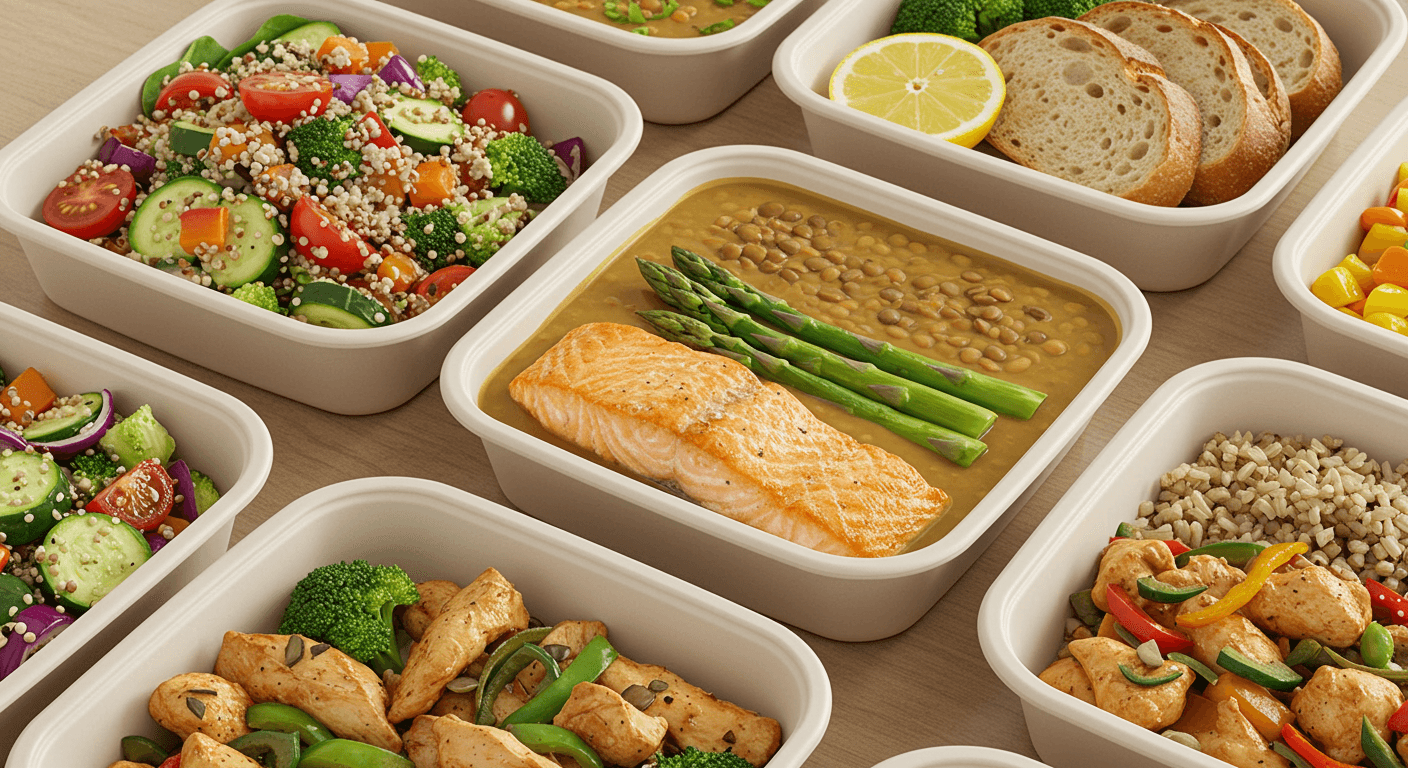Top Takeaways and Key Concepts
Mindful eating means being present during meals: Focus on food's taste, texture, and appearance instead of distractions.
Slow down to avoid overeating: Taking smaller bites helps your brain register fullness and prevents overconsumption.
Listen to your body’s hunger cues: Check in with yourself to determine if you’re genuinely hungry or eating out of habit.
Create a distraction-free zone during meals: Put away phones and screens to fully enjoy your meal and improve mindfulness.
Allow variety and indulgence without guilt: Embrace occasional treats mindfully to enjoy them fully and avoid regret.
Summary of This Article
This article introduces mindful eating as a sustainable approach to weight loss. By focusing on the sensory experience of eating, slowing down, and listening to your body, you can improve digestion and avoid overeating. The article encourages creating a distraction-free meal environment and finding balance by occasionally enjoying indulgent foods without guilt. Journaling meals and joining supportive communities are also recommended for tracking progress and maintaining motivation. Mindful eating offers a more enjoyable and lasting solution to healthy eating than restrictive diets.

In a world where we’re constantly bombarded with diet plans promising miraculous results—like losing weight while eating nothing but kale and drinking lemon juice (no thanks!)—it’s time to talk about something that feels a bit more human: mindful eating.
Picture this: instead of shoveling food into your mouth like you’re in an Olympic speed-eating contest, you actually take the time to enjoy what’s on your plate. Crazy, right? But hear me out! This approach could be your secret weapon for sustainable weight loss.
Understanding Mindful Eating
So, what exactly is mindful eating? Essentially, it’s about being present during meals. Instead of zoning out while scrolling through social media or binge-watching the latest must-see series, you focus on the experience of eating. You know, like how food tastes, its texture, and even the colors on your plate. It’s almost like turning every meal into a culinary art show!
I remember one dinner where I decided to practice this concept. I made a delicious pasta dish (which I may or may not have added too much cheese to). Instead of mindlessly scarfing it down while half-listening to my friend tell a story about their cat's new haircut—seriously, who cares?—I concentrated on each bite. The flavors exploded in my mouth! Suddenly, I was savoring every noodle instead of just treating it as fuel.
The Importance of Slowing Down
By the way, slowing down can work wonders for our bodies and minds. When we eat too quickly, our brains don’t get enough time to register fullness signals from our stomachs. Ever eaten so fast that you felt stuffed afterward? That’s because your brain was still buffering while your stomach hit “full” mode!
Taking smaller bites and chewing thoroughly can help with this process. Honestly, it sounds simple—and it is! Just think about how much longer those tasty morsels will last if you chew them like they owe you money.
Listening to Your Body
Now let’s see… listening to your body is another crucial aspect of mindful eating. We often forget that our bodies are pretty good at telling us when they need food and when they’ve had enough. It’s kind of like having an internal GPS system guiding us toward satisfaction—but only if we pay attention!
Next time you're tempted to eat just because it's “lunchtime,” ask yourself if you're genuinely hungry or simply bored (or maybe watching TV). I once found myself reaching for snacks during movie marathons without even realizing it until halfway through the bag! Now I check in with myself before diving into popcorn territory.
Creating a Distraction-Free Zone
Speaking of distractions—it helps immensely if you create a distraction-free zone during meals. This means putting away phones and shutting off screens (yes, even that reality show featuring people trying bizarre foods). Trust me; focusing solely on your meal makes all the difference.
I tried this one evening by dimming the lights and lighting candles—a little fancy ambiance never hurt anyone! My family thought I’d lost my mind at first but soon joined in as we enjoyed our dinner together without interruptions from technology or random TikTok videos popping up mid-bite.
Enjoying Variety Without Guilt
Interestingly enough, mindful eating also encourages embracing variety without guilt! We often feel pressured to stick strictly within certain dietary guidelines (hello again kale!). But guess what? Food should be enjoyable!
When practicing mindfulness around meals, allow yourself room for indulgences occasionally—maybe that slice of chocolate cake or cheesy pizza doesn’t sound bad after all! By incorporating these treats mindfully rather than devouring them absentmindedly under stress or boredom—you’ll likely find satisfaction rather than regret afterward.
Keeping Track with Journaling
Now here comes something unexpected: journaling can play an important role in mindful eating too! Keeping track of meals helps raise awareness about what works best for us personally regarding hunger levels and cravings over time.
After starting my own journal journey several months ago (and yes—I used colorful pens), I've noticed patterns emerging about when I crave certain foods versus feeling satisfied after meals. It adds insight into habits that might otherwise go unnoticed amidst life chaos!
Finding Supportive Communities
Lastly—and this is key—finding supportive communities can make all difference during any weight-loss journey involving mindful practices! Whether online forums dedicated specifically toward healthy lifestyles or local meetups focused around cooking classes together—it keeps motivation high while sharing experiences along way!
On the other hand though…you might encounter some naysayers who scoff at “mindfulness” as just another buzzword trend—but don't let them deter progress towards healthier habits!
In conclusion—with patience comes great rewards through implementing these strategies within daily routines over long term periods instead quick fixes full deprivation tactics leading nowhere except frustration land!
Suggested Resources
Mindful Eating: A Guide to Rediscovering a Healthy and Joyful Relationship with Food
https://www.eatright.org/health/wellness/mindful-eating
Mindful Eating Practices
https://www.mindfuleating.org/
How Mindful Eating Can Help You Lose Weight
https://www.healthline.com/nutrition/mindful-eating-weight-loss
Frequently Asked Questions
What is mindful eating and how does it support weight loss?
Mindful eating involves paying full attention to the eating experience, which helps control portions, improve digestion, and reduce overeating for sustainable weight loss.
How can slowing down during meals help me lose weight?
Eating slowly allows your brain to register fullness, preventing overeating and helping you feel satisfied with smaller portions.
Why is it important to listen to hunger cues?
Recognizing true hunger versus emotional or habitual eating helps you eat only when necessary and maintain a healthier relationship with food.
What are some ways to create a distraction-free eating environment?
Turn off screens, put away your phone, and focus on your food’s taste, smell, and texture to enhance mindfulness during meals.
Can I still enjoy indulgent foods while practicing mindful eating?
Yes. Mindful eating encourages balance, allowing you to enjoy treats in moderation without guilt or bingeing.
How does journaling support mindful eating?
Meal journaling increases awareness of your eating habits, helps track hunger patterns, and promotes conscious food choices over time.
What role does community support play in mindful eating?
Joining supportive groups or communities can help maintain motivation, provide accountability, and share mindful eating experiences.

Kevin Collier is a passionate health writer specializing in fat loss, weight loss strategies, and effective dieting techniques. With an emphasis on evidence-based approaches, he aims to provide readers with actionable insights that simplify the journey to achieving their weight loss goals. At TapFat.com, Kevin shares practical advice, tips, and motivational content to empower individuals to make informed choices about their diet and lifestyle. His mission is to support others in their pursuit of a healthier, fitter self, demystifying the weight loss process and celebrating each step toward success.




